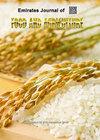Assessment of Camel Owners’ Knowledge and Practical Behaviors and its Implication on Environmental Sustainability
IF 0.7
4区 农林科学
Q3 AGRONOMY
引用次数: 0
Abstract
This study aimed to assess camel owners’ knowledge and practical behavior (KPB) in Saudi Arabia (KSA) and their implications on environmental sustainability. The study depended mainly on primary data. An online questionnaire survey was used to collect data from 267 respondents, in 2022. Descriptive and analytical techniques were used to achieve the stated objectives. Results revealed that, the majority of camels’ owners (91.7%) have low cumulative KPB, which was evident in their traditional practice and non-commercial methods in herd management. Moreover, large numbers of breeders do not sell their milk production due to their traditions, thus, about 23% of them gained no profits. Results also showed that, about 85% of owners were located in the lower level of using cost items (modern technology and labor training), accordingly, 96.6% fall within the low level of profit category. Likewise, about 75% of camels’ owners’ grazing behavior were located in the lower and medium level groups. Furthermore, the cumulative (KPB) effect of age, educational level, main job, training levels, cost of production and grazing behavior were found to be statistically significant in explaining CKPB variations of camels’ owners in KSA. The R-2 indicated that 59% of the variations in the dependent variable was explained by the variations of the independent variables. The also revealed the presence of high degree of positive association between camels’ owners’ CKPB and environmental sustainability. This study stresses on the importance of execution of sound agricultural extension programs and veterinary campaigns to improve camels’ owners’ CKPB. Key words: Camel Raising, Environmental Sustainability, Grazing Behavior, Knowledge and Practical Behavior, KSA.骆驼主人知识与实践行为评价及其对环境可持续性的启示
本研究旨在评估沙特阿拉伯骆驼主人的知识和实践行为(KPB)及其对环境可持续性的影响。这项研究主要依靠原始资料。2022年,一项在线问卷调查收集了267名受访者的数据。使用了描述和分析技术来实现所述目标。结果表明,绝大多数(91.7%)骆驼主人的累积KPB较低,这体现在他们传统的放牧方式和非商业管理方式中。此外,由于传统原因,大量养殖户不出售他们的牛奶产品,因此,约23%的养殖户没有获得利润。结果还显示,约85%的业主位于使用成本较低的项目(现代技术和劳动力培训),相应地,96.6%的业主属于低利润水平。同样,大约75%的骆驼主人的放牧行为位于中低水平群体。此外,年龄、受教育程度、主要职业、培训水平、生产成本和放牧行为的累积效应在解释骆驼主人CKPB变化方面具有统计学意义。R-2表明,59%的因变量变化可以用自变量的变化来解释。研究还发现,骆驼主人的CKPB与环境可持续性存在高度正相关。本研究强调了实施健全的农业推广计划和兽医运动以改善骆驼主人CKPB的重要性。& # x0D;关键词:骆驼饲养,环境可持续性,放牧行为,知识与实践行为,KSA
本文章由计算机程序翻译,如有差异,请以英文原文为准。
求助全文
约1分钟内获得全文
求助全文
来源期刊

Emirates Journal of Food and Agriculture
AGRONOMYFOOD SCIENCE & TECHNOLOGY&nb-FOOD SCIENCE & TECHNOLOGY
CiteScore
1.80
自引率
0.00%
发文量
18
期刊介绍:
The "Emirates Journal of Food and Agriculture [EJFA]" is a unique, peer-reviewed Journal of Food and Agriculture publishing basic and applied research articles in the field of agricultural and food sciences by the College of Food and Agriculture, United Arab Emirates University, United Arab Emirates.
 求助内容:
求助内容: 应助结果提醒方式:
应助结果提醒方式:


